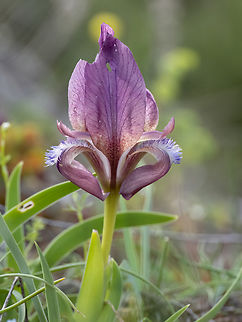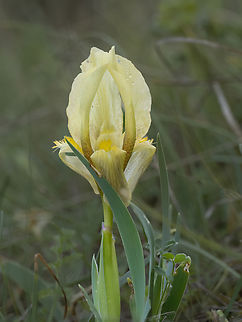
Appearance
"Iris suaveolens" is similar in form to "Iris attica", or "Iris reichenbachii", "Iris lutescens", and "Iris pumila".It has thick but small rhizomes, that are thick, but small,
It has evergreen, falcate, or curved leaves. The short, blue green, or greyish, leaves can grow up to between 7–22 cm long, and between 0.4 and 1 cm wide.
One form of the species, known as 'rubromarginata', has red-violet, or reddish purple edging on the leaves.
It is a dwarf iris, which has a slender, simple stem, or peduncle, that can grow up to between 8–15 cm tall. The flowers are held above the foliage.
The stem has two green, lanceolate, spathes, which are keeled, and 2.5–8 cm long. They remain green after the flowers have faded. The stem holds between 1 and 2, terminal flowers, in spring, blooming between late March to mid-April, or between March to May.
The fragrant, flowers are 4.5–5.5 cm in diameter, come in various shades between yellow and purple, with yellow being the most common. Other shades of flower colour include; yellow-green, white, cream, violet-blue, smoky brown, mahogany,: 186 or purplish-brown. There can also be bi-coloured forms as well. The yellow forms can sometimes have spots, of brown-purple.
Like other irises, it has two pairs of petals, three large sepals, known as 'falls' and three inner, smaller petals, known as 'standards'.: 17 The obovate or cuneate falls, curl under themselves,: 186 and are flaring. They can be 3–5.5 cm long. In the middle of the falls, there is a row of short hairs called the 'beard', which is white, orange, or yellow, on the yellow forms, but normally bluish, or white tipped with blue. The upright standards, are shorter and wider than the falls.: 186 The perianth tube is the same length as the Stigma #Style branch, about 5–7.6 cm long.
The seed capsule contains reddish brown, sub-globose seeds.

Status
It is found in a few places, but most of these are now protected under law, including in the Dobruja Plateau of Romania.Habitat
It grows on open dry, rocky hillsides, amid light scrub, and scattered juniper trees.Defense
Like many other irises, most parts of the plant are poisonous, and if ingested can cause stomach pains and vomiting. Handling the plant may cause skin irritation or an allergic reactions.Uses
It can be used as an expectorant, diuretic and for the treatment of children dentition.References:
Some text fragments are auto parsed from Wikipedia.